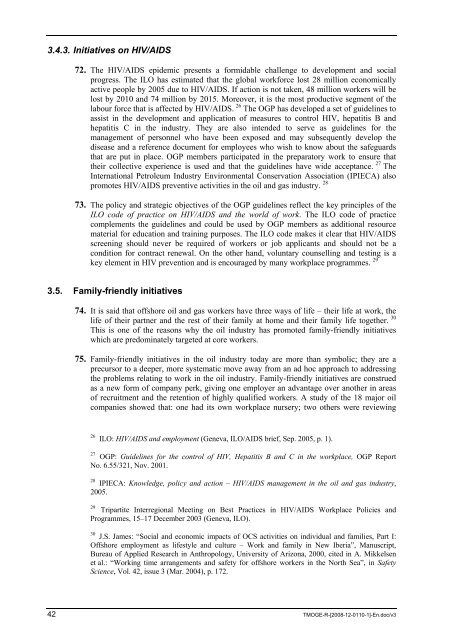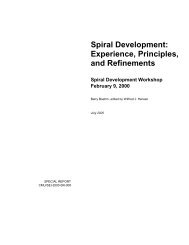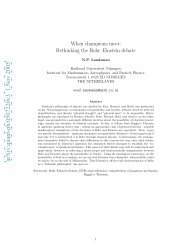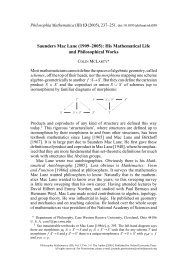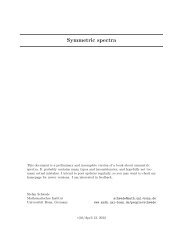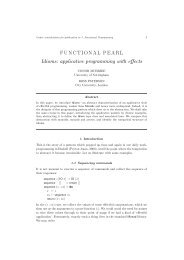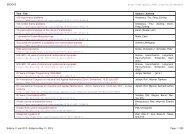wcms_161662
wcms_161662
wcms_161662
You also want an ePaper? Increase the reach of your titles
YUMPU automatically turns print PDFs into web optimized ePapers that Google loves.
3.4.3. Initiatives on HIV/AIDS<br />
72. The HIV/AIDS epidemic presents a formidable challenge to development and social<br />
progress. The ILO has estimated that the global workforce lost 28 million economically<br />
active people by 2005 due to HIV/AIDS. If action is not taken, 48 million workers will be<br />
lost by 2010 and 74 million by 2015. Moreover, it is the most productive segment of the<br />
labour force that is affected by HIV/AIDS. 26 The OGP has developed a set of guidelines to<br />
assist in the development and application of measures to control HIV, hepatitis B and<br />
hepatitis C in the industry. They are also intended to serve as guidelines for the<br />
management of personnel who have been exposed and may subsequently develop the<br />
disease and a reference document for employees who wish to know about the safeguards<br />
that are put in place. OGP members participated in the preparatory work to ensure that<br />
their collective experience is used and that the guidelines have wide acceptance. 27 The<br />
International Petroleum Industry Environmental Conservation Association (IPIECA) also<br />
promotes HIV/AIDS preventive activities in the oil and gas industry. 28<br />
73. The policy and strategic objectives of the OGP guidelines reflect the key principles of the<br />
ILO code of practice on HIV/AIDS and the world of work. The ILO code of practice<br />
complements the guidelines and could be used by OGP members as additional resource<br />
material for education and training purposes. The ILO code makes it clear that HIV/AIDS<br />
screening should never be required of workers or job applicants and should not be a<br />
condition for contract renewal. On the other hand, voluntary counselling and testing is a<br />
key element in HIV prevention and is encouraged by many workplace programmes. 29<br />
3.5. Family-friendly initiatives<br />
74. It is said that offshore oil and gas workers have three ways of life – their life at work, the<br />
life of their partner and the rest of their family at home and their family life together. 30<br />
This is one of the reasons why the oil industry has promoted family-friendly initiatives<br />
which are predominately targeted at core workers.<br />
75. Family-friendly initiatives in the oil industry today are more than symbolic; they are a<br />
precursor to a deeper, more systematic move away from an ad hoc approach to addressing<br />
the problems relating to work in the oil industry. Family-friendly initiatives are construed<br />
as a new form of company perk, giving one employer an advantage over another in areas<br />
of recruitment and the retention of highly qualified workers. A study of the 18 major oil<br />
companies showed that: one had its own workplace nursery; two others were reviewing<br />
26 ILO: HIV/AIDS and employment (Geneva, ILO/AIDS brief, Sep. 2005, p. 1).<br />
27<br />
OGP: Guidelines for the control of HIV, Hepatitis B and C in the workplace, OGP Report<br />
No. 6.55/321, Nov. 2001.<br />
28<br />
IPIECA: Knowledge, policy and action – HIV/AIDS management in the oil and gas industry,<br />
2005.<br />
29 Tripartite Interregional Meeting on Best Practices in HIV/AIDS Workplace Policies and<br />
Programmes, 15–17 December 2003 (Geneva, ILO).<br />
30 J.S. James: “Social and economic impacts of OCS activities on individual and families, Part I:<br />
Offshore employment as lifestyle and culture – Work and family in New Iberia”, Manuscript,<br />
Bureau of Applied Research in Anthropology, University of Arizona, 2000, cited in A. Mikkelsen<br />
et al.: “Working time arrangements and safety for offshore workers in the North Sea”, in Safety<br />
Science, Vol. 42, issue 3 (Mar. 2004), p. 172.<br />
42 TMOGE-R-[2008-12-0110-1]-En.doc/v3


